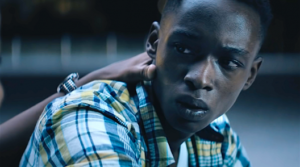 There are plenty of good films out there, but I have to confess that the dominance of mediocre Hollywood pablum sometimes challenges my faith in cinema. However, I recently got to see a movie that shows me once again what we really need from film—fearless honesty and a fresh point of view. Moonlight, directed by Barry Jenkins, is the story of a young man growing up black and gay in Miami, told not with a conventional narrative arc, but in three discrete sections about the boy, the teenager, and the man, each like a flash of summer lightning illuminating a time of life and a different level of awareness.
There are plenty of good films out there, but I have to confess that the dominance of mediocre Hollywood pablum sometimes challenges my faith in cinema. However, I recently got to see a movie that shows me once again what we really need from film—fearless honesty and a fresh point of view. Moonlight, directed by Barry Jenkins, is the story of a young man growing up black and gay in Miami, told not with a conventional narrative arc, but in three discrete sections about the boy, the teenager, and the man, each like a flash of summer lightning illuminating a time of life and a different level of awareness.
In the first section, taking place in the 1980s, nine-year-old Chiron, nicknamed “Little,” and played by Alex Hibbert, runs into a boarded up house to escape a gang of bullies. He is spotted by a local drug dealer named Juan, played by Mahershala Ali, and although the boy is stubbornly mute, Juan takes him home and feeds him, while his girlfriend tries to draw him out. Their patience and love eventually creates a bond with Little, although he remains wary and withdrawn. His mother, played by Naomie Harris, is a drug addict who is incapable of being there for him. Juan becomes a kind of surrogate father to Little, creating a safe space where he can grow.
In the second section, Chiron is now a wiry teenager played by Ashton Sanders, incessantly bullied and tormented by homophobic classmates. Juan has died, but he still has a connection with Juan’s girlfriend Teresa, played by Janelle Monae. His mother, meanwhile, has sunk even further into crack addiction. And his extroverted longtime friend Kevin represents a ray of hope, but violence and betrayal threaten to extinguish that light.
The resemblance between the two actors playing Chiron, who didn’t meet each other during the filming, is amazing. That’s because the director Jenkins sought to find performers who can let us see the pain right underneath the surface. The same goes for Trevante Rhodes, playing the adult Chiron in the film’s third section depicting his coming to terms with himself as a man.
The meaning we absorb through the three-part unfolding of Moonlight is greater than a portrait of African Americans living with poverty, racism, and the pernicious war on drugs, although it conveys that as well. It’s about the humanity that struggles, endures, and emerges anew against all odds in a troubled soul. It is also about the lifting of a young man’s sexuality out of shame and into acceptance.
This is a film of pain and silence, which communicates to us through imagery and music more than through words. The cinematography is achingly beautiful, with each section having a different style and color scheme. The story by Tarell McCraney is autobiographical—he grew up like Chiron in Liberty City, a tough predominately black Miami neighborhood. And although they didn’t meet as kids, just a few blocks away from McCraney lived the film’s director, Barry Jenkins.
Moonlight gives utterance to the thoughts and feelings too often hidden inside, and to the urgent and overwhelming human need for intimacy.

